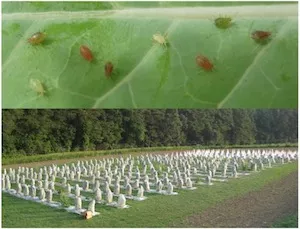
Ecological effects of aphid abundance, genotypic variation, and contemporary evolution in plants
Genes have a long reach. It is long been appreciated that genes direct cellular processes in every living organism. It is less appreciated that genes and their evolution can affect the ecological interactions within entire communities. Graduated PhD student Nash Turley (Johnson Lab) just demonstrated this very thing in his paper: “Ecological effects of aphid abundance, genotypic variation, and contemporary evolution in plants”, published in Oecologia. Nash examined how different genotypes of the Green Peach Aphid (Myzus persicae-top right image), their rapid evolution and the abundance of aphids together affect the performance and physiology of two plant species. His experiments (bottom right image) show that genotypic differences among aphids and the rate of their evolution strongly influenced plant biomass, while aphid genotype also affected leaf nitrogen. These effects were comparable and often interacted with the effects of aphid abundance. Nash’s study shows that genetic variation and evolution within a species can have ecological effects that reach far beyond an organism’s own phenotype. Nash is now a post-doc at Michigan State University. Congrats Nash!
